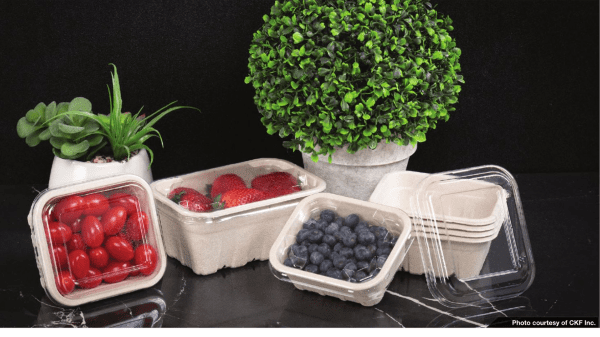An update on sustainable, biodegradable, and recyclable packaging
I came across the perfect package 35 years ago. During a trip to India, I was riding on an uncomfortable bus, which at one point made a rest stop. At the roadside, a man was selling green coconuts (they cost a rupee each, equaling about 8 cents).
When you bought one, he drove a hole into the eye and gave you a straw. You drank the fresh, sweet coconut water. It was quite a different experience from what is packaged as coconut water in today’s supermarkets.
Afterwards, you threw the empty coconut onto a large pile of similarly exhausted specimens. It would be hard to imagine a more elegant or environmentally sustainable way of delivering a product.
Multifaceted Requirements
In the produce industry, as in many others, the packaging problem is complex and multifaceted.
Packaging must satisfy a number of requirements: (1) it must protect the product to the point where it reaches the consumer; (2) it should give consumers a clear idea of what they are buying; (3) it should enable the producer to market the product; and (4) increasingly, it must be part of a sustainability strategy, which (in part) means the packaging should be recyclable or at least biodegradable.
A 45-minute video from Closed Loop Partners, LLC in New York suggests the complexity of the issues.
For example, a clear plastic cup is made of bioplastic (possibly corn or cassava), so the consumer believes it’s biodegradable. But this is functionally identical to plastic made from petroleum and should be recycled in the same way.
How about a paper salad bowl? This isn’t really recyclable because it has food residue that will contaminate the recycling equipment.
The video indicates the source of the material isn’t the only thing that needs to be considered—there’s the equally if not more important question of where it’s going when the consumer is done with it, and how much value can be extracted from it then.
Some polyethylene terephthalate (PET) plastics, which are easily recyclable, have high value. A paper salad bowl, for reasons stated above, does not, and with many having a microplastic coating (so they don’t get soggy), they aren’t compostable either.
This is an excerpt from the Applied Technology feature in the September/October 2021 issue of Produce Blueprints Magazine. Click here to read the whole issue.



